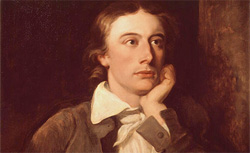What a hatchet job on John Keats teaches us.
Posted on Slate, Thursday, July 21, 2011Possibly the most famous book review, ever, was written by the young Irish wit and polemicist John Wilson Croker. Croker is still remembered, though obscurely, as a founder of modern political conservatism. What's more, according to some sources, John Wilson Croker invented the very term "conservative."
The opening passage of Croker's review, published in the September 1818 Quarterly Review, displays his formidable and venomous approach. What he writes is smart as well as odious. It is also quite wrong, in more than one sense of the word: Reviewers have been sometimes accused of not reading the works which they affected to criticise. On the present occasion we shall anticipate the author's complaint, and honestly confess that we have not read his work. Not that we have been wanting in our duty - far from it - indeed, we have made efforts almost as superhuman as the story itself appears to be, to get through it; but with the fullest stretch of our perseverance, we are forced to confess that we have not been able to struggle beyond the first of the four books of which this Poetic Romance consists. We should extremely lament this want of energy, or whatever it may be, on our parts, were it not for one consolation - namely, that we are no better acquainted with the meaning of the book through which we have so painfully toiled, than we are with that of the three which we have not looked into.
Few 21st-century journalists can match the cool snark-power of this passage. Croker's rhetorical muscle and shrewdness shine through the formal idiom and manners of 200 years ago. This is nastiness at its most effulgent.He continues, with a well-calculated, languidly aristocratic tone of affected vagueness, as though not sure where he read a snotty phrase he borrows:
It is not that Mr Keats, (if that be his real name, for we almost doubt that any man in his sense would put his real name to such a rhapsody,) it is not, we say, that the author has not powers of language, rays of fancy, and gleams of genius - he has all these; but he is unhappily a disciple of the new school of what has been somewhere called Cockney poetry; which may be defined to consist of the most incongruous ideas in the most uncouth language. ...
[Mr Keats] is a copyist of Mr Hunt; but he is more unintelligible, almost as rugged, twice as diffuse, and ten times more tiresome and absurd than his prototype ...Full essay at Slate.

No comments:
Post a Comment